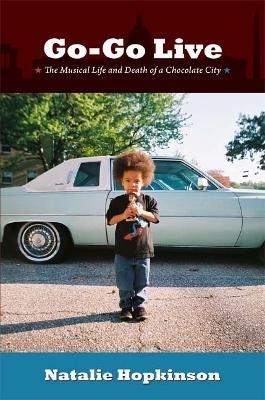
Go-Go Live
Duke University Press (Verlag)
978-0-8223-5200-6 (ISBN)
- Titel z.Zt. nicht lieferbar
- Versandkostenfrei innerhalb Deutschlands
- Auch auf Rechnung
- Verfügbarkeit in der Filiale vor Ort prüfen
- Artikel merken
Go-go is the conga drum–inflected black popular music that emerged in Washington, D.C., during the 1970s. The guitarist Chuck Brown, the "Godfather of Go-Go," created the music by mixing sounds borrowed from church and the blues with the funk and flavor that he picked up playing for a local Latino band. Born in the inner city, amid the charred ruins of the 1968 race riots, go-go generated a distinct culture and an economy of independent, almost exclusively black-owned businesses that sold tickets to shows and recordings of live go-gos. At the peak of its popularity, in the 1980s, go-go could be heard around the capital every night of the week, on college campuses and in crumbling historic theaters, hole-in-the-wall nightclubs, backyards, and city parks. Go-Go Live is a social history of black Washington told through its go-go music and culture. Encompassing dance moves, nightclubs, and fashion, as well as the voices of artists, fans, business owners, and politicians, Natalie Hopkinson's Washington-based narrative reflects the broader history of race in urban America in the second half of the twentieth century and the early twenty-first. In the 1990s, the middle class that had left the city for the suburbs in the postwar years began to return. Gentrification drove up property values and pushed go-go into D.C.'s suburbs. The Chocolate City is in decline, but its heart, D.C.'s distinctive go-go musical culture, continues to beat. On any given night, there's live go-go in the D.C. metro area.
Natalie Hopkinson, a contributing editor of TheRoot.com, lectures at Georgetown University and directs the Future of the Arts and Society project as a fellow of the Interactivity Foundation. She is the author, with Natalie Y. Moore, of Deconstructing Tyrone: A New Look at Black Masculinity in the Hip-Hop Generation. A former writer and editor at the Washington Post, Hopkinson has contributed to the Wall Street Journal, the New York Times, and TheAtlantic.com and done commentary for NPR and the BBC.
Preface ix
Acknowledgments xv
1. A Black Body Politic 1
2. Club U 14
3. What's Happening 30
4. Call and Response 46
Gallery 67
5. The Archive 86
6. The Boondocks 102
7. Redemption Song 123
8. Mr. Obama's Washington , D.C. 144
9. Roll Call, 1986 162
Notes 179
Bibliography 189
Index 203
| Zusatzinfo | 34 illustrations |
|---|---|
| Verlagsort | North Carolina |
| Sprache | englisch |
| Maße | 156 x 235 mm |
| Gewicht | 499 g |
| Themenwelt | Kunst / Musik / Theater ► Musik ► Jazz / Blues |
| Sozialwissenschaften ► Ethnologie | |
| Sozialwissenschaften ► Soziologie | |
| ISBN-10 | 0-8223-5200-1 / 0822352001 |
| ISBN-13 | 978-0-8223-5200-6 / 9780822352006 |
| Zustand | Neuware |
| Haben Sie eine Frage zum Produkt? |
aus dem Bereich


